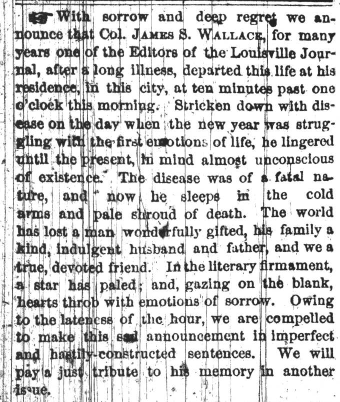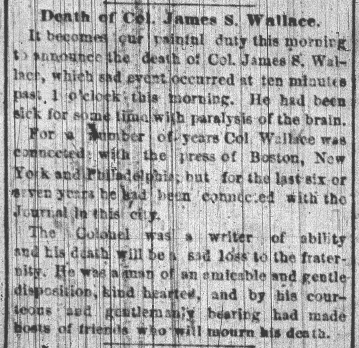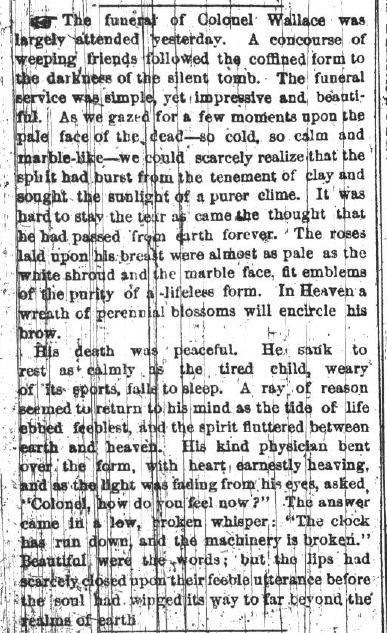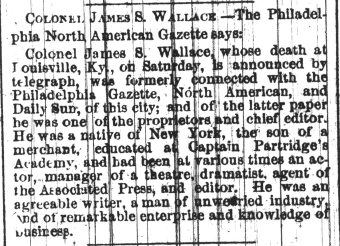

The Louisville Journal, 18 Feb 1865.
With sorrow and deep regret we announce that Col. James S. Wallace, for many years one of the Editors of the Louisville Journal, after a long illness, departed this life at his residence, in this city, at ten minutes past one o'clock this morning. Stricken down with disease on the day when the new year was struggling with the first emotions of life, he lingered until the present, his mind almost unconscious of existence. The disease was of a fatal nature, and now he sleeps in the cold arms and pale shroud of death. The world has lost a man wonderfully gifted, his family a kind, indulgent husband and father, and we a true devoted friend. In the literary firmament, a star has paled; and gazing on the blank, hearts throb with emotions of sorrow. Owing to the lateness of the hour we are compelled to make this sad announcement in imperfect and hastily-constructed sentences. We will pay a just tribute to his memory in another issue.

The Louisville Daily Democrat, 18 Feb 1865.
Death of Col. James S. Wallace
It becomes our painful duty this morning to announce the death of Col. James S. Wallace, which sad event occurred at ten minutes past 1 o'clock this morning. He had been sick for some time with paralysis of the brain.
For a number of years Col. Wallace was connected with the press of Boston, New York, and Philadelphia, but for the last six or seven years he had been connected with the Journal in this city.
The Colonel was a writer of ability and his death will be a sad loss to the fraternity. He ws a man of amicable and gentle disposition, kind hearted, and by his courteous and gentlemanly bearing had made hosts of friends who will mourn his death.

The Louisville Journal, 19 Feb 1865.
DIED,
At his residence in this city, Colonel James S. Wallace, of paralysis, in the 60th year of his age.
The funeral will take place from his late residence, on Fourth street, between Walnut and Chestnut, Sunday at 2 1/2 o'clock P.M.

The Louisville Journal, 20 Feb 1865.
The funeral of Colonel Wallace was largely attended yesterday. A concourse of weeping friends followed the coffined form to the darkness of the silent tomb. The funeral service was simple, yet impressive and beautiful. As we gazed for a few moments upon the pale face of the dead - so cold, so calm and marble-like - we could scarcely realize that the spirit had burst from the tenement of clay and sought the sunlight of a purer clime. It was hard to stay the tear as came the thought that he had passed from earth forever. The roses laid upon his breast were almost as pale as the white shroud and the marble face, fit emblems of the purity of a lifeless form. In Heaven a wreath of perennial blossoms will encircle his brow.
His death was peaceful. He sank to rest as calmly as the tired child, weary of its sports, falls to sleep. A ray of reason seemed to return to his mind as the tide of life ebbed feeblest, and the spirit fluttered between earth and heaven. His kind physician bent over the form, with heart earnestly heaving, and as the light was fading from his eyes, asked "Colonel, how do you feel now?" The answer came in a low, broken whisper: "The clock has run down, and the machinery is broken." Beautiful were the words; but the lips had scarcely closed upon their feeble utterance before the soul had winged its way to far beyond the realms of earth.

The Louisville Journal, 20 Feb 1865.
A National Loss - We have announced the death of Colonel James S. Wallace, late Assistant Editor of this paper with which he had been connected several years. Few, very few events, not of a national character, have so deeply afflicted us. The loss of such a man, so pure, so true, so generous, so gifted, makes dim the lives of those who knew and loved him. A lurid cloud will seem for a time to hang between their souls and the stars of mortal existence.
Although we knew Colonel Wallace long and intimately, he spoke so little of himself that we have not the materials for giving even a slight biographical sketch of him. He was for some years chief editor of one of the principal papers in Philadelphia, and won very great distinction both for it and himself. Afterwards he became a Washington correspondent of several of the chief papers of the country; and so great was his facility and versatility, that no matter how many he wrote for, he gave the greatest satisfaction to all, and no one could suspect, from reading his letters, that any two of them were from the same hand. Inexhaustibly affluent in mental resources, he never either repeated himself or drew on others.
Colonel W. was for many years a stage manager, and certainly one of the very best that the country ever had. He was perfectly familiar with the merits and demerits of all the prominent actors and actresses both of this country and of Europe, but he was often too kind and generous in his estimate of them to be sternly just. He loved to approve, and hated to condemn. He gave popularity to every theatre with which he was connected. he was the most accomplished theatrical critic that we ever knew. In his criticisms, which were probably more numerous than those of almost any other writer of the day, it was not his habit to deal, as most do, in sweeping remarks, for, unlike most, he had sound judgment and keen and exact discrimination. He praised what was meritorious and censured what was not, the former warmly and glowingly, the latter kindly and reluctantly.
Colonel Wallace's connection with the Louisville Journal commenced in 1860, and continued till the day when he became the victim of a mysterious and, as it proved, mortal visitation. Our readers knew him as one who abounded in wit, humor, fancy, pathos, genius, learning, eloquence, and power. He was ever ready to write and to write well upon almost any subject in the whole circle of literature, science, politics, and the business affairs of life. In his treatment of his subject, he could be as light and ethereal as gossamer or as solid as the heart of oak. His thoughts and fancies could flutter with the fluttering butterfly and mount with the mounting eagle. They could illumine and beautify like a lambent flame or consume like the lightning. His long connection with politics and politicians rendered his mind a treasury of political knowledge, whose rich stores were ever at his command.
Colonel Wallace, as many thousands can attest, was not less admirable as a man than as a writer. By his social and genial and intellectual qualities, he amused and enlighten and adorned every company in which he chanced to be. His keen and quick and ever-ready repartee never wounded the most sensitive or even the most jealous nature. He always retained the fine and joyous effervescence of youth. Time, that silvered his hair, made more golden his nature. His heart, throughout all his years, kept its freshness like a shaded stream. The blossoms and buds of his soul, in spite of frosts and winds and storms, bloomed and sang as beautifully and sweetly in his age ad in the prime of his young manhood. No cloud ever hung over him so dark that his thoughts could not span it with a double rainbow. If he saw approaching gloom in the distance, he also say hope beaming above it like a star over the dark outline of a midnight forest. His bright spirit looked out, like a lamp, into the "world's tempestuous night." He diffused happiness around him according to his opportunities. The many tears which in life he prevented from falling, wil fall freely for his death. His soul was an Eden, and the stream that went out of it was goodness, and the four into which the one divided were justice, charity, truth, and love. And in that garden "the Lord walked in the cool of the day."
We do not suppose that our departed friend had an enemy in the world, or that he was the enemy of any human being. Though brave, he was gentle. We sympathize with the multitude of those who will mourn for him, and we crave their sympathy. Most deeply do we sympathize with his large, interesting, and desolated family. The strong arm upon which they leaned lies cold and nerveless on its sod, the voice that spoke to them so many words of kindness is among the lost sounds of earth, the eyes that ever beamed on them so lovingly are darkened with a seal that only the Angel of the Resurrection shall break, and the heart tht beat in such quick response to all their wants and wishes is quenched in damps that no mortal sun shall ever dry.
Farewell, old friend. The green earth is above thy mortal form, but the blue sky is no longer above thy immortal soul.

The Louisville Journal, 24 Feb 1865.
Reprinted from The Philadelphia North American Gazette
Colonel James S. Wallace - The Philadelphia North American Gazette says:
Colonel James S. Wallace, whose death at Louisville, Ky., on Saturday, is announced by telegraph, was formerly connected with the Philadelphia Gazette, North American, and Daily Sun, of this city; and of the latter paper he was one of the proprietors and chief editor. He was a native of New York, the son of a merchant, educated at Captain Partridge's Academy, and had been at various times an actor, manager of a theatre, dramatist, agent of the Associated Press, and editor. He was an agreeable writer, a man of unworried industry, and of remarkable enterprise and knowledge of business.

The Louisville Journal, 28 Feb 1865.
Reprinted from The Philadelphia Press
The Late James S. Wallace. - In the lamented death of Colonel James S. Wallace at Louisville, Kentucky, in common with others of his friends we deeply sympathize and would fain offer a passing tribute to his memory in a brief sketch of his life and writings that may not prove unacceptable to that public in whose service he had long tolled, and whose tastes and pleasures he was ever most anxious to subserve. The deceased was a native of New York State, where his mother and daughters now reside -- the descendants of one of its most ancient and respectable families. James S. Wallace was carefully educated in academical studies, and was placed at the proper age in Colonel Partridge's military institution in Connecticut, where he graduated with honors. His predominant taste was literary, and at this juvenile period he contributed to the serial magazines and newspapers several acknowledged talented articles on foreign and domestic literature. As a belles-lettres scholar his style and matter exhibited vigorous thought with polished diction. He was a constant reader, and remembered what he read. His father intended him for the law, and he had entered upon its studies with infinite gout; but his proclivities suddenly became manifested in newspaper writing and thus initiated him into the editorial corps of the New York press. In this position he soon was known as one its most felicitous and ready writers, wherein he evinced the genius of political thought on the then exciting tariff question of the day. With the arts he was quite au fait, especially devoted to dramatic literature and as such was deemed a reliable and brilliant critic, which his Thespian vocations as actor, prompter, and stage manager gave him ample experience to acquire and improve. We here will trespass upon our alloted space to enumerate many of his most successful dramatized works. In 1833 he produced at the Warren Theatre, Boston, the national drama of "Westward Ho!" This piece ran upwards of fifty nights successively. The "Spy at Washington" -- a clever hit at certain peculiarities and political individuals that fill up a Congressional dramatis personce, was brought out at the little Franklin, New York, in 1837, and "Love and Legislature," produced at Albany for Duffey & W. Forrest's corps. But the one he adapted to stage representation with the most tact and Compact acting compass was "The Water Witch," from Cooper's novel. it ran through the entire season, John R. Scott making an immense hit in the Skipper. This came out at the Arch, in 1832, under the reign of Jones, Duffy & Forrest. He also cleverly dramatized Paul Clifford, and others, as "The Fairy and the Wooden Shoemaker," translated from the French. About 1841 he became editor and part proprietor of a leading political Whig paper in Harrisburg, and finally removed to Philadelphia where he became editor and one of the partners in the Daily Sun, a penny paper, of Native hue, modifying into an ardent advocacy of Whig doctrines. In this new position he won "golden opinions from all sorts of people," but especially from the leading Whigs of the party. The breaking up of that once formidable political power finally caused the withdrawal of the deceased from our city to the West. For the last six years, to the last breath which left his life, he was editorially associated with the celebrated George D. Prentice, in the Louisville Journal. he had received the sobriquet of the "handsome Colonel," from his genial companions, as significant of his fine figure, chivalric mein, and genial, bland manners. He leaves a widow and some eight children to mourn his memory and to bewail their bereavement, for he was the light and living source to them, leaving no means to assuage their sorrows. Let us pray that an overruling Providence may cast its beneficent mantle of love over the orphaned group of the departed editor.

Pottsville, Pennsylvania Miner's Journal, 25 Feb 1865.
Col. James S. Wallace - The many old friends of Col. Wallace, residing here, were pained to learn that the distinguished writer died in Louisville, Ky., on Saturday last, - Col. Wallace possessed attractive social qualities, while his nobleness of soul endeared him to all who knew him. As a journalist, there were few superior to him in abilitiy or vim. As a friend he was true as steel. As a husband, kind. As a father, indulgent. To his immediate family circle his death is irreparable. Colonel Wallace was the son of a leading merchant of New York. He came to this Region in 1828, where he sojourned for a brief period, but long enough to gain by his vivacity and kindness, many life-long friends. In 1838 he returned to this Borough, and his pen for more than a year enriched the columns of the Miner's Journal, as its editor. In 1840 he removed to Harrisburg, where he became first editor, then joint proprietor of the Telegraph. In 1842 he received an invitation to take editorial charge of The Forum, a penny paper of Philadelphia. He accepted it, and removed to the City that year. He subsequently was connected with the Philadelphia Gazette, and North American, in an editorial position, and for six or seven years was joint proprietor and editor of the Sun, which under his charge had a large circulation, and was unquestionably one of the ablest and most influential newspaper[s] ever published in Philadelphia. About six years since Colonel Wallace removed from Philadelphia to Louisville where he became associated with Mr. Prentice in the editorial conduct of the Journal. Its columns soon bore evidence of the signal ability of Colonel Wallace. In wit, sprightliness, delicate imagery, powerful argument, it was soon discovered he was the peer of the renowned Prentice, and it became difficult to distinguish between the productions of the two. Much that appeared in the Journal which was naturally attributed to the graceful pen of Mr. Prentice was written by Col. Wallace. Mr. Prentice in his death loses a valuable assistant.
The cause of his death was paralysis. Unremitting, arduous labor for over a quarter of a century, with his pen in that most wearing of positions - editor of the daily press - completely prostrated his health, and he died after a confinement of several weeks to his bed. He leaves a wife and eight children.
The writer of this knew Colonel Wallace very intimately, and can say truly that he never knew the subject of this notice guilty of an unjust or unkind action to anybody. Even in a profession in which asperities are too often engendered by personal and ill-tempered argument, he was literally without an enemy. The editorial profession of this State, without exception, remembers him kindly, and regrets his death. But, "after life's fitful fever he sleeps well."
The Philadelphia Press of Thursday last, contains the following communication written by a gentleman - if we are not mistaken in the identity of the initials of the signature - who was intimately acquainted with him for a period running over a third of a century:
[What followed was the obituary from the Philadelphia Press, displayed above.]
Effort has been made to eliminate errors, but their absence is not guaranteed. This document is copyright 2018 by Charles Hartley. Permission is hereby granted to individuals seeking family history information to copy the contents of this document for their personal use. It may not be sold, either separately or as part of a collection, without the written permission of the copyright holder; nor may it be placed at any other location on the internet without said written permission.